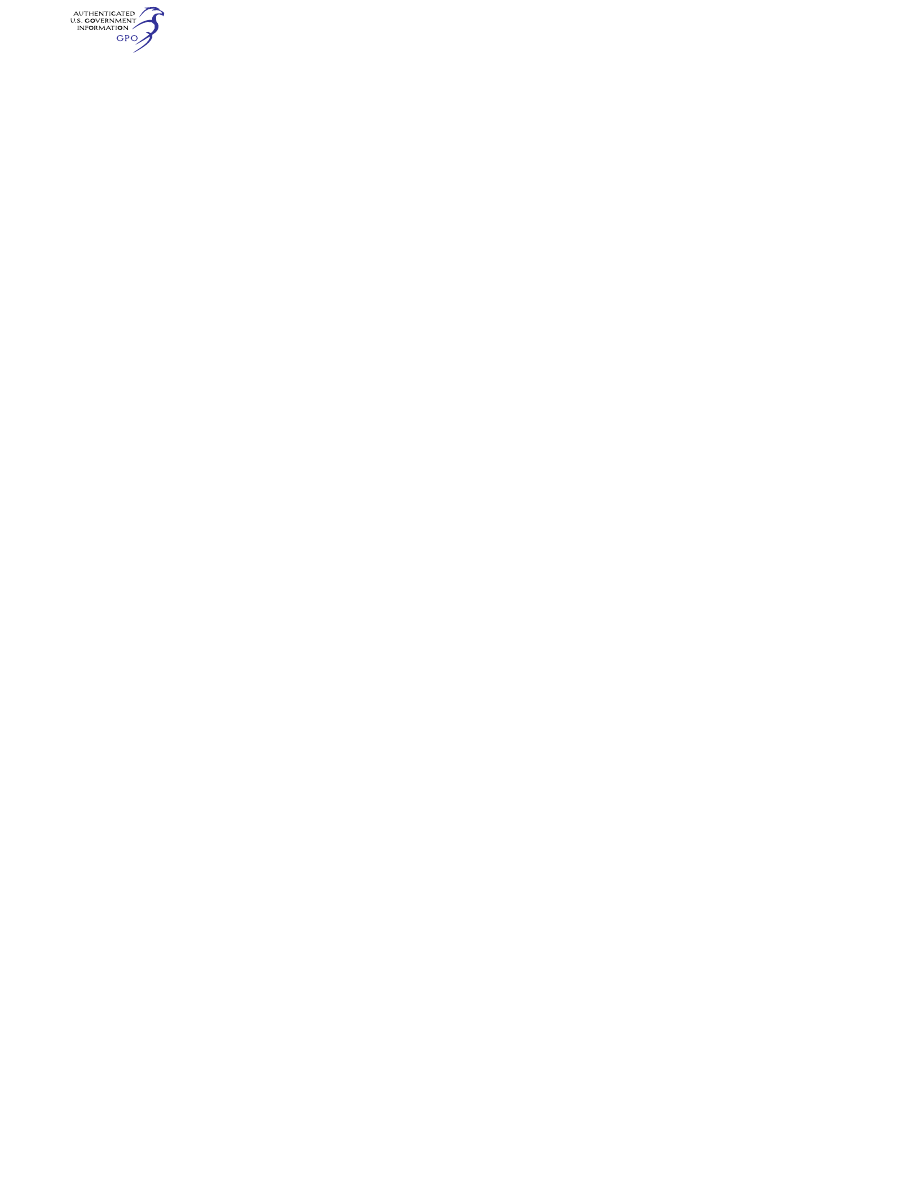
737
Federal Aviation Administration, DOT
§ 91.327
candidates for election to public office
in State and local government elec-
tions.
[Doc. No. FAA–2005–20168, 70 FR 4982, Jan. 31,
2005]
§ 91.323
Increased maximum certifi-
cated weights for certain airplanes
operated in Alaska.
(a) Notwithstanding any other provi-
sion of the Federal Aviation Regula-
tions, the Administrator will approve,
as provided in this section, an increase
in the maximum certificated weight of
an airplane type certificated under
Aeronautics Bulletin No. 7–A of the
U.S. Department of Commerce dated
January 1, 1931, as amended, or under
the normal category of part 4a of the
former Civil Air Regulations (14 CFR
part 4a, 1964 ed.) if that airplane is op-
erated in the State of Alaska by—
(1) A certificate holder conducting
operations under part 121 or part 135 of
this chapter; or
(2) The U.S. Department of Interior
in conducting its game and fish law en-
forcement activities or its manage-
ment, fire detection, and fire suppres-
sion activities concerning public lands.
(b) The maximum certificated weight
approved under this section may not
exceed—
(1) 12,500 pounds;
(2) 115 percent of the maximum
weight listed in the FAA aircraft speci-
fications;
(3) The weight at which the airplane
meets the positive maneuvering load
factor
n, where n=2.1+(24,000/(W+10,000))
and W=design maximum takeoff
weight, except that n need not be more
than 3.8; or
(4) The weight at which the airplane
meets the climb performance require-
ments under which it was type certifi-
cated.
(c) In determining the maximum cer-
tificated weight, the Administrator
considers the structural soundness of
the airplane and the terrain to be tra-
versed.
(d) The maximum certificated weight
determined under this section is added
to the airplane’s operation limitations
and is identified as the maximum
weight authorized for operations with-
in the State of Alaska.
[Doc. No. 18334, 54 FR 34308, Aug. 18, 1989;
Amdt. 91–211, 54 FR 41211, Oct. 5, 1989, as
amended by Amdt. 91–253, 62 FR 13253, Mar.
19, 1997; Docket FAA–2015–1621, Amdt. 91–346,
81 FR 96700, Dec. 30, 2016]
§ 91.325
Primary category aircraft: Op-
erating limitations.
(a) No person may operate a primary
category aircraft carrying persons or
property for compensation or hire.
(b) No person may operate a primary
category aircraft that is maintained by
the pilot-owner under an approved spe-
cial inspection and maintenance pro-
gram except—
(1) The pilot-owner; or
(2) A designee of the pilot-owner, pro-
vided that the pilot-owner does not re-
ceive compensation for the use of the
aircraft.
[Doc. No. 23345, 57 FR 41370, Sept. 9, 1992]
§ 91.327
Aircraft having a special air-
worthiness certificate in the light-
sport category: Operating limita-
tions.
(a) No person may operate an aircraft
that has a special airworthiness certifi-
cate in the light-sport category for
compensation or hire except—
(1) To tow a glider or an unpowered
ultralight vehicle in accordance with
§ 91.309 of this chapter; or
(2) To conduct flight training.
(b) No person may operate an aircraft
that has a special airworthiness certifi-
cate in the light-sport category un-
less—
(1) The aircraft is maintained by a
certificated repairman with a light-
sport aircraft maintenance rating, an
appropriately rated mechanic, or an
appropriately rated repair station in
accordance with the applicable provi-
sions of part 43 of this chapter and
maintenance and inspection procedures
developed by the aircraft manufacturer
or a person acceptable to the FAA;
(2) A condition inspection is per-
formed once every 12 calendar months
by a certificated repairman (light-sport
aircraft) with a maintenance rating, an
appropriately rated mechanic, or an
appropriately rated repair station in
accordance with inspection procedures
VerDate Sep<11>2014
14:00 Mar 14, 2024
Jkt 262047
PO 00000
Frm 00747
Fmt 8010
Sfmt 8010
Q:\14\14V2.TXT
PC31
aworley on LAPBH6H6L3 with DISTILLER

738
14 CFR Ch. I (1–1–24 Edition)
§§ 91.328–91.399
developed by the aircraft manufacturer
or a person acceptable to the FAA;
(3) The owner or operator complies
with all applicable airworthiness direc-
tives;
(4) The owner or operator complies
with each safety directive applicable to
the aircraft that corrects an existing
unsafe condition. In lieu of complying
with a safety directive an owner or op-
erator may—
(i) Correct the unsafe condition in a
manner different from that specified in
the safety directive provided the per-
son issuing the directive concurs with
the action; or
(ii) Obtain an FAA waiver from the
provisions of the safety directive based
on a conclusion that the safety direc-
tive was issued without adhering to the
applicable consensus standard;
(5) Each alteration accomplished
after the aircraft’s date of manufacture
meets the applicable and current con-
sensus standard and has been author-
ized by either the manufacturer or a
person acceptable to the FAA;
(6) Each major alteration to an air-
craft product produced under a con-
sensus standard is authorized, per-
formed and inspected in accordance
with maintenance and inspection pro-
cedures developed by the manufacturer
or a person acceptable to the FAA; and
(7) The owner or operator complies
with the requirements for the record-
ing of major repairs and major alter-
ations performed on type-certificated
products in accordance with § 43.9(d) of
this chapter, and with the retention re-
quirements in § 91.417.
(c) No person may operate an aircraft
issued a special airworthiness certifi-
cate in the light-sport category to tow
a glider or unpowered ultralight vehi-
cle for compensation or hire or conduct
flight training for compensation or
hire in an aircraft which that persons
provides unless within the preceding
100 hours of time in service the aircraft
has—
(1) Been inspected by a certificated
repairman with a light-sport aircraft
maintenance rating, an appropriately
rated mechanic, or an appropriately
rated repair station in accordance with
inspection procedures developed by the
aircraft manufacturer or a person ac-
ceptable to the FAA and been approved
for return to service in accordance
with part 43 of this chapter; or
(2) Received an inspection for the
issuance of an airworthiness certificate
in accordance with part 21 of this chap-
ter.
(d) Each person operating an aircraft
issued a special airworthiness certifi-
cate in the light-sport category must
operate the aircraft in accordance with
the aircraft’s operating instructions,
including any provisions for necessary
operating equipment specified in the
aircraft’s equipment list.
(e) Each person operating an aircraft
issued a special airworthiness certifi-
cate in the light-sport category must
advise each person carried of the spe-
cial nature of the aircraft and that the
aircraft does not meet the airworthi-
ness requirements for an aircraft
issued a standard airworthiness certifi-
cate.
(f) The FAA may prescribe additional
limitations that it considers necessary.
[Doc. No. FAA–2001–11133, 69 FR 44881, July
27, 2004]
§§ 91.328–91.399
[Reserved]
Subpart E—Maintenance, Preven-
tive Maintenance, and Alter-
ations
S
OURCE
: Docket No. 18334, 54 FR 34311, Aug.
18, 1989, unless otherwise noted.
§ 91.401
Applicability.
(a) This subpart prescribes rules gov-
erning the maintenance, preventive
maintenance, and alterations of U.S.-
registered civil aircraft operating with-
in or outside of the United States.
(b) Sections 91.405, 91.409, 91.411,
91.417, and 91.419 of this subpart do not
apply to an aircraft maintained in ac-
cordance with a continuous airworthi-
ness maintenance program as provided
in part 121, 129, or §§ 91.1411 or
135.411(a)(2) of this chapter.
(c) Sections 91.405 and 91.409 of this
part do not apply to an airplane in-
spected in accordance with part 125 of
this chapter.
[Doc. No. 18334, 54 FR 34311, Aug. 18, 1989, as
amended by Amdt. 91–267, 66 FR 21066, Apr.
27, 2001; Amdt. 91–280, 68 FR 54560, Sept. 17,
2003]
VerDate Sep<11>2014
14:00 Mar 14, 2024
Jkt 262047
PO 00000
Frm 00748
Fmt 8010
Sfmt 8010
Q:\14\14V2.TXT
PC31
aworley on LAPBH6H6L3 with DISTILLER

